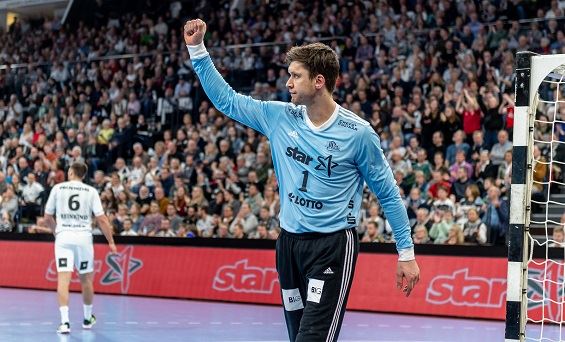

More than 25,000 fans in Kiel and 196 goals from Porto
More than 25,000 fans in Kiel and 196 goals from Porto
Like all previous seasons of the EHF Cup in its current format, the hosts of the four-team finals tournament have qualified directly from the group phase.
This time, THW Kiel have gained free passage to the AKQUINET EHF Cup Finals on 17/18 May after winning all six group matches, with FC Porto Sofarma as the only other team with a perfect six-from-six record in the group phase, which ended last weekend.
Here are the most interesting Facts & Figures of the Men’s EHF Cup 2018/19 after the group phase:
0 French teams have won the EHF Cup in its current format (since 2012/13) or the former Cup Winners’ Cup. Saint-Raphael still become the first this season.
0 teams finished the group phase with zero points; Polish side Azoty-Pulawy ended on just one.
1 quarter-final features two teams from the same country: Füchse Berlin vs TSV Hannover-Burgdorf.
1 non-German team has won the EHF Cup under its current format: Pick Szeged beat Montpellier in the 2014 final in Berlin.
1 champion under the current format successfully defended the title the following year: Frisch Auf Göppingen won in 2016 in Nantes and in 2017 on home court. Füchse could match that feat this season.
1 team is a quarter-finalist for the fourth straight time: Saint-Raphaël.
1 or more German teams have been part of all EHF Cup Finals since 2013.
1 team that started Qualification Round 2 is still in the competition: Porto.
1 former EHF Champions League winner - as every year so far - is still in the race for the EHF Cup trophy: THW Kiel (EHF Champions League winners in 2007, 2010 and 2012). Earlier it were SC Magdeburg (three times), Montpellier (2014) and Hamburg (2015).
2 EHF Cup Quarter-final debutants are among the seven teams still in competition: Hannover and Porto.
2 times – in 2017 and 2018 - three of the four participants at the EHF Cup Finals were from Germany.
2 teams – AKQUINET EHF Cup Finals hosts THW Kiel and FC Porto Sofarma – finished the group phase with the maximum of six wins.
2 of the six teams in the quarter-finals were also quarter-finalists last season: Saint-Raphaël and Berlin, who both went on to reach the final in 2018.
2 all-German finals have been played since 2013: Berlin vs Hamburg in 2015 and Göppingen vs Berlin in 2017.
2 of 48 group matches ended in a draw, the same number as last year.
2 of 48 group matches ended with 45 or fewer goals, the same number as last year.
2 hosts of the EHF Cup Finals won the trophy: Berlin in 2015 and Göppingen in 2017. Berlin (2014) and Magdeburg (2018) lost in the semis, Nantes in the final twice - against Löwen (2013) and Göppingen (2016).
2 former EHF Cup winners are still in competition: THW Kiel (old version in 1998, 2002, 2004) and Berlin (2015).
4 EHF Cup titles is the record for a single club, held by Göppingen (2011, 2012, 2016, 2017). Kiel and Magdeburg both won three times.
5 of 6 times since the competition was merged, the winner came from Germany: Rhein-Neckar Löwen (2013), Berlin (2015, 2018) and Göppingen (2016, 2017).
5 nations are represented by the six quarter-finalists (Germany (2), France, Portugal, Hungary and Denmark), compared to four last year (Germany, France, Spain and Croatia).
7 times, which means every time, the hosts of the EHF Cup Finals qualified directly from the group phase by skipping the quarter-finals: Nantes in 2013 and 2016, Berlin in 2014 and 2015, Göppingen in 2017, Magdeburg in 2018, Kiel in 2019.
7 times the lowest-ranked runners-up did not advance to the quarter-finals; this year GOG, last year another Danish side: Bjerringbro-Silkeborg.
7 nations have had teams playing at the EHF Cup Finals (since 2013) so far: Germany (12 teams), France (6), Denmark (2), Romania, Hungary, Slovenia, Spain (1 each).
9 of 48 group matches ended with a goal difference of ten or more, compared to four last year.
12 group matches were attended by more than 3,000 fans, compared to seven in the previous season.
14 goals was the biggest winning margin in a group match, when Kiel beat GOG 37:23.
14 times between 1993 and 2012, German teams won the old format of the EHF Cup; five more times under the new format: Löwen in 2013, Berlin in 2015 and 2018, Göppingen in 2016 and 2017.
16 away wins were among the 48 group matches compared to 20 last year.
18 of 48 group matches ended with 60 or more goals scored, compared to 15 last year.
21 – which means all – home matches in their EHF Cup history since 1998 have been won by THW Kiel.
23 EHF Cup matches in a row (22 wins, 1 draw), Göppingen remained unbeaten: from the quarter-final away defeat at Magdeburg in April 2016 until defeat in the semi-final against Berlin in May 2018.
30 of the 48 group matches ended with a win for the home team, compared to 26 in the previous season.
41 goals was the fewest amount of goals in a group phase match: Nexe vs Eurofarm 23:18.
+47 is the best goal difference in the group phase, by THW Kiel.
70 goals was the highest amount of goals in a group phase match: GOG vs Pulawy 41:29.
75 goals were scored by Holstebro’s Magnus Bramming to lead the top scorers’ list, ahead of Adrian Figueras (Granollers, 60) and Hans Lindberg (Berlin, 57). Lindberg was the competition’s top scorer in 2016/17 and again in 2017/18.
144 was the lowest amount of goals conceded in the group phase - by both Kiel and Hannover.
196 was the highest amount of goals scored in the group phase - by Porto.
2,729 goals were scored in the group phase – from 623 in Group B to 716 in Group D.
9,006 fans were the highest attendance in the group phase, for Kiel vs Granollers, almost the same number of fans saw the match Berlin vs Balatonfüred (9,000).
25,232 fans were the overall attendance of Kiel’s three home matches in the group phase, a new competition record with an average of 8,410.
Top 3 rankings of the Men's EHF Cup Group Phase 2018/19:
Most goals:
70 goals: Holstebro vs Pulawy (41:29)
69 goals: Balatonfüred vs La Rioja (35:34)
68 goals: Pulawy vs Granollers (34:34)
Fewest goals:
41 goals: Nexe vs Bitola (23:18)
45 goals: Hannover vs Bitola (24:21)
46 goals: Bitola vs Hannover (17:29)
Biggest winning margin:
+14 goals: Kiel vs GOG (37:23)
+13 goals: Berlin vs Balatonfüred (36:23)
+12 goals: Holstebro vs Cuenca (34:22)
Spectators:
9,006: Kiel vs Granollers
9,000: Berlin vs Balatonfüred
8,619: Kiel vs GOG
Best attack:
196 goals scored: Porto
192 goals scored: Berlin
191 goals scored: Kiel
Best defence:
144 goals conceded: Kiel and Hannover
154 goals conceded: Tatabánya
160 goals conceded: Nexe and Holstebro
Best goal difference:
+47: Kiel
+28: Porto
+26: Berlin
Top scorers:
75 goals: Magnus Bramming (Holstebro)
60 goals: Adrian Figueras (Granollers)
57 goals: Hans Lindberg (Berlin)






